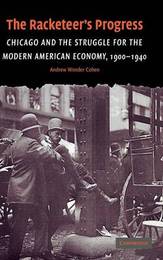
|
The Racketeer's Progress: Chicago and the Struggle for the Modern American Economy, 1900-1940
Hardback
Main Details
| Title |
The Racketeer's Progress: Chicago and the Struggle for the Modern American Economy, 1900-1940
|
| Authors and Contributors |
By (author) Andrew Wender Cohen
|
| Series | Cambridge Historical Studies in American Law and Society |
|---|
| Physical Properties |
| Format:Hardback | | Pages:352 | | Dimensions(mm): Height 229,Width 152 |
|
| ISBN/Barcode |
9780521834667
|
| Classifications | Dewey:977.311042 |
|---|
| Audience | | Postgraduate, Research & Scholarly | |
|---|
|
Publishing Details |
| Publisher |
Cambridge University Press
|
| Imprint |
Cambridge University Press
|
| Publication Date |
3 May 2004 |
| Publication Country |
United Kingdom
|
Description
The Racketeer's Progress explores the contested and contingent origins of the modern American economy by examining the violent resistance to its development. It explains how carpenters, teamsters, barbers, musicians, and others organized to thwart ambitious national corporations. Unions and associations governed commerce through pickets, assaults, and bombings. Scholars often ignore this defiance, painting modernization as a consensual process and presenting craftsmen as reactionary, corrupt, and criminal. This is ironic, for the tradesmen's reputation derives from their successful struggle to control modernization and the emerging consumer economy. Their resistance redirected American law. Progressive-era courts rebuked the craftsmen for attempting to govern trade. In the 1920s, the tradesmen inspired new criminal concepts, such as 'racketeering'. But the Great Depression reversed harsh laws. The craftsmen became a model for New Deal recovery statutes and a focus for constitutional debates. Meanwhile, the state began protecting unions against gangsters like Al Capone.
Reviews'Insisting that we look beyond the gleaming factories and department stores that have dominated the historical literature to the highly complex, unstable, and violent world of small businessmen and skilled craftsmen that dominated the early twentieth-century city and fiercely resisted the triumph of corporate capitalism, Andrew Cohen makes us look at the social organization of the city anew and develops a bracing reinterpretation of the political economy of the Progressive Era and New Deal. Prodigiously researched and boldly argued, this is revisionist history at its best.' George Chauncey, University of Chicago
|